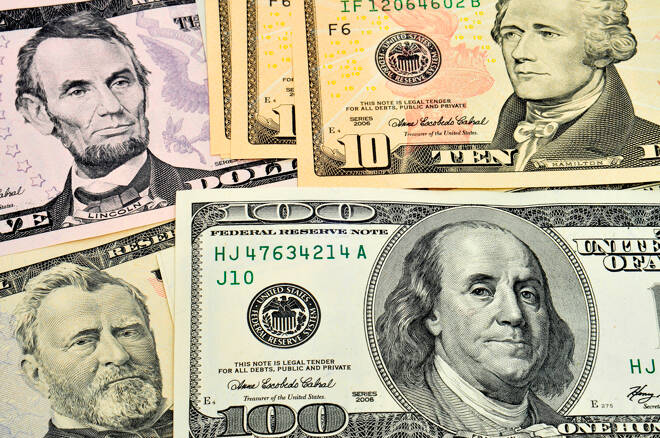Advertisement
Advertisement
U.S Dollar Gains For A Fifth Straight Week
By:
Nevertheless, it gained 0.73% on the week and is on course for its fifth consecutive weekly gain
A newly discovered variant of COVID-19 dampened investors’ risk appetite Friday morning, causing the dollar to drop but losses to be minimized.
As of early Friday morning, the US Dollar Index rose from daily lows to 96.69, paring intraday losses to its highest level since July 2020.
Based on the bearish MACD signals and the greenback’s ability to rise beyond 96.9, the greenback’s correction from intraday low seems to have a limited life.
The bears remain hopeful due to the trend-reversal suggestive candle and MACD signals. An ascending support line from November 09, near 96.65, and a clear downside break of the 20-SMA are necessary for the seller to enter.
After reaching its highest level in nearly 17 months on Wednesday, the index moved further away from 96.938. Nevertheless, it gained 0.73% on the week and is on course for its fifth consecutive weekly gain.
Minutes from the Fed’s Nov. 2-3 meeting helped boost the dollar on Wednesday, as it indicated that the Fed had become increasingly concerned about rising inflation.
Several policymakers have said they are willing to speed up the tapering of their bond-buying programs if inflation remains high and if interest rates are raised more quickly.
Wednesday’s data showed the number of U.S. layoffs was at a 52-year low, consumer spending rose more than expected in October, and inflation was on the rise.
The euro climbed 0.16% against the dollar to $1.121, a slight recovery. So far this month, it has still lost about 3% due to expectations that the European Central Bank will be more dovish than the Fed, as well as a new wave of European COVID-19 regulations.
In light of the fact that the DXY (dollar index) is heavily skewed toward Western European currencies due to an aggressive Fed and fourth wave in Europe, the DXY looks very bid.
According to a survey released Thursday, a spike in Coronavirus infections in Germany and unusually high inflation rates are affecting consumer confidence in Europe’s largest economy.
The central bank of Sweden left monetary policy unchanged, predicting an easing of inflation next year. The bank has penciled in its first-rate hike after the pandemic for the end of 2024.
About the Author
Olumide Adesinaauthor
Olumide Adesina is a France-born Nigerian. He is a Certified Investment Trader, with more than 15 years of working expertise in Investment trading. He is a Member of the Chartered Financial Analyst Society.
Advertisement
